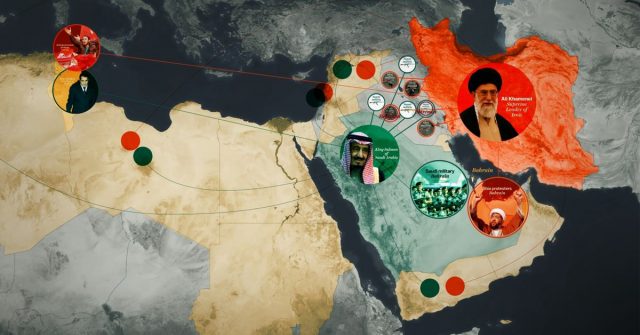.
By Rachel Avraham
Recently, there was a blast outside the Israeli Embassy in New Delhi, which was believed to have been orchestrated by the Islamic Republic of Iran. Around the same period, Iran threatened to “demolish Tel Aviv and Haifa.” Meanwhile, Iranian diplomat Assadollah Assadi has been jailed for recruiting agents to bomb a conference sponsored by the National Council of the Resistance of Iran in Paris, a plot against Iranian dissidents, that was foiled by the Belgium, French and German police. The threats posed by the Iranian regime are more apparent than ever.
However, it did not need to be like this. The ineptness of former US President Barack Obama on the Middle East has had a lasting impact on the region, as his appeasement to the Mullahs led to an increase in instability and insecurity in the Middle East. This was best demonstrated by the nuclear deal with Iran, which granted the Islamic Republic billions of dollars in a vain attempt to persuade them to limit, not even eliminate, their nuclear activity. Iran utilized this money to spread its terrorist tentacles across the Middle East, propping up the Houthis in Yemen, Hezbollah in Lebanon, Assad in Syria, Hamas and the Islamic Jihad in the Palestinian Authority, and the Shia militias in Iraq. All of them committed major human rights violations. Iran also expanded its terror networks in Africa and Latin America.
Fortunately, former US President Donald Trump was able to successfully put this charade to an end. He took the United States out of the nuclear deal, as he understood that it was the mistake of the century. He applied a maximum pressure policy that cut off most of the Mullahs oil revenues, thereby depriving Iranian-backed proxies their funding. He also eliminated one of the most dangerous terrorists in the world, Qassem Soleimani. If Trump had gotten another term, Obama’s disastrous Middle East policies and the Mullahs regime would be delegated to the dustbins of history. But now, the United States has a president who wants to reverse all these important policies, that had strategically benefited both Israel and the United States. He has thereby emboldened the Iranian terror regime to once again be more aggressive.
Paulo Casaca, a former European MP, noted that the Biden administration has initiated an unprecedented wave of presidential orders intending to reverse the measures taken by its predecessor: “Whereas this was swiftly done for international agreements such as the Paris Agreement on Climate Change and rejoining the World Health Organization, things will certainly be more complex with the Iran deal despite the Biden administration’s declared commitment to do it as soon as possible.” He thinks that the nuclear deal is now dead, since its two main partners, the US and Iran, abandoned it.
Casaca also believes that President Biden is resurrecting rather than rejoining the Iranian nuclear deal. Considering this, he said: “From the technical point of view, a new Iran deal would need to set a new calendar and apply targets for reducing the stocks of uranium and dealing with the new advances of the Iranian nuclear program exposed in the meantime.”
But there is also another aspect and it is political. During the last days of Trump’s presidency, numerous Muslim countries signed peace agreements with Israel. Casaca warned that resurrecting the Iranian nuclear deal puts these agreements in great danger: “It means fundamentally to destroy the Abraham Accords built by the Trump administration and to send an overly aggressive signal to the Arab world.” It will also lead to increased finances for the Iranian Revolutionary Guards. He believes that Biden’s decision to block key Arab states from acquiring advanced US weapons is a great mistake. He hopes the European Union, Israel, and the Arab world will be able to press the Biden Administration to move away from this suicidal path.
Dr. Reza Parchizadeh, an Iranian political theorist, believes that although Biden will change most of President Trump`s executive orders, he will still try to keep the Abraham Accords intact: “Trump did one thing for which he deserves credit, and which I consider the crown jewel of his achievements and the single most important act of both his foreign and domestic policy, and that is the concluding of the Abraham Accords between the Arabs and Israel after more than seven decades of deadly and destructive conflict.”
Parchizadeh believes that Biden will not want pause or pull out of a process that led to peace, yet the fact that the Abraham Accords also includes a strategic alliance against Iran makes Biden less enthusiastic about them: “The fact that his administration will be at odds with Arabs and Israel with regard to the regime in Iran, whose aggressive behavior in the Middle East was one of the major incentives behind the Abraham Accords, can strain this regional strategic alliance.”
“For Arabs and Israel, the Islamist regime is an existential threat that should be eliminated; conversely, for the Democratic administration of President Biden, the regime in Iran is only a security threat that can be ameliorated,” he noted. Parchizadeh believes that Biden, Israel and Arab countries have different approaches to the issue of Iran and this can highly determine the relationship between the United States and its partners in the Middle East in the coming years.
On the other hand, Dr. Baban Aliassi, a Kurdish political analyst in Switzerland, emphasized: “In the Middle East, the Trump administration has accentuated its policy, on two main axes: the Arab-Israeli question, as well as the withdrawal of the nuclear deal with Iran and the maximum economic and military pressures on that country. The normalization of relations between Israel and the Arab countries resulted in the creation of an Arab-Israeli coalition against Iran.”
Aliassi believes although Biden will seek to return to the nuclear deal, he will have to recognize that the conditions are now different. He believes that the Iranian ballistic missile project and their interference in the region will be integrated into the negotiations. He also thinks the Israelis and Saudis will have a seat at the negotiation table.
He thinks that Biden will be able to build off Trump’s maximum pressure campaign during the probable negotiations. However, at the same time, he added that Iran may be willing to play off its main and powerful card in the negotiations, which is the uranium enrichment that is a major threat to the region and the world at large: “This puts the international community, including the Americans, Europeans, and other countries in the region, under enormous pressure. On their part, the Israelis see the Iranian nuclear issue as an existential threat to their country and will not stand against a rival Iran with nuclear weapons.”
He does not ignore the possibility of a war between Israel and Iran, if the situation goes on like this, since Israel has shown in the past that its right to exist is a red line for any country and they will do everything to defend their territory: “In the past, the Israelis have attacked an Iraqi nuclear reactor in 1981 and a site with nuclear components in Syria in 2007.”
He declared that Iran must end its destabilizing actions in the region or must expect a war: “If Iran does not back down in its nuclear weapons program, its ballistic missile project, and its interference in other countries, the risk of military clashes in the region should not be excluded.”
In relation to Iraq and Afghanistan, Aliassi estimates that Biden`s policy towards these two countries be completely the reverse of Trump’s. While the Trump administration sought to withdraw US military forces from those two countries and to establish peace and security by negotiations, “Biden’s team have already announced that they will not consider a withdrawal of their armed forces from Iraq and Afghanistan.”
It seems that Biden`s policies toward the Middle East are the reverse of Trump’s. Sirwan Mansouri, a Kurdish journalist based in Middle East, believes that Biden seems to have no significant policy toward the Middle East, since before the presidential elections, he declared that if he would be elected, he will immediately go back to the Iranian nuclear deal, but now he and his team have not done that yet.
Mansouri points to the lasting effects of Trump’s Middle East policy. He noted that Trump’s maximum pressure policy related to Iran made it easier for Biden to negotiate a new deal, since Iran is now very weak economically, politically, and socially. He also noted that the Abraham Accords and the fact that many other nations will soon join this alliance gives Israel more freedom of action “because it has a big coalition” and Biden has “little chance to see Israel satisfied from a new nuclear deal.”
According to Mansouri, although Biden wants a different Iran policy, Trump did such a good job in formulating a new Middle Eastern reality that he has little choice but to continue Trump’s policy, at least until a new and better Iran deal can be signed, which now Iran is not willing to consider: “To counter Iran’s threats in the region, Biden should consider Israeli and Arab concerns.”
Sources:
How Will US Middle East Policy Change Under Biden? – voanews.com
A Dangerous Transition for America and the Middle East – tcf.org
How a Biden win could transform US policy in the Middle East and North Africa – ecfr.eu
The Middle East is already wondering what could change under Biden – thearabweekly.com
Iranian rationale behind New Delhi terror attack – ICT
Belgium jails Iranian journalist over foiled bomb plot – France 24
Iran will demolish Tel Aviv, Haifa if attacked – Al Arabiya
 Rachel Avraham is a political analyst working for the Safadi Center for International Diplomacy, Research, Public Relations and Human Rights, which is run by Mendi Safadi, a former Likud Candidate for the Knesset and a former chief of staff of former Israeli Communication Minister Ayoob Kara. Since 2012, she has been working as an Israel-based journalist and writer, covering Iran, Kurdistan, Turkey, Iraq, Syria, the Israeli-Palestinian conflict and other developments in the greater Islamic world.
Rachel Avraham is a political analyst working for the Safadi Center for International Diplomacy, Research, Public Relations and Human Rights, which is run by Mendi Safadi, a former Likud Candidate for the Knesset and a former chief of staff of former Israeli Communication Minister Ayoob Kara. Since 2012, she has been working as an Israel-based journalist and writer, covering Iran, Kurdistan, Turkey, Iraq, Syria, the Israeli-Palestinian conflict and other developments in the greater Islamic world.
Her articles have appeared in the Washington Times, the Hill, Front Page Magazine, the Daily Wire, the Christian Post, the Baltimore Jewish Times, the Jerusalem Post, Israel Hayom, Ahval and many other publications across the globe. She received her MA in Middle Eastern Studies from Ben-Gurion University. She got her BA in Government and Politics with minors in Jewish Studies and Middle Eastern Studies from the University of Maryland at College Park.
Ken`s new book The Multifront War is out! It is available in 190 countries via Amazon and in also on BNs in the US. Buy it now!
.
.






